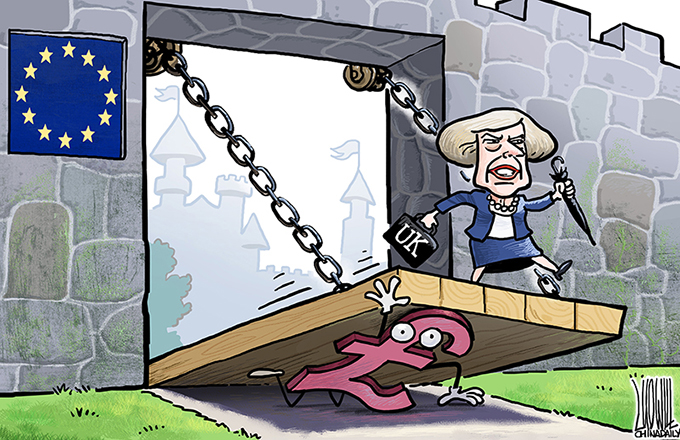Private capital can help make a difference
 |
|
A Davos logo is seen before the annual meeting of the World Economic Forum (WEF) in Davos, Switzerland January 15, 2017. [Photo/Agencies] |
At the World Economic Forum Annual Meeting in Davos, one key topic was the increasing importance of private rather than public capital in solving problems that don't respect national boundaries.
To really make a difference, capital needs to be invested on a massive scale. The United Nations' Sustainable Development Goals are 17 challenging global targets for the year 2030 in areas such as education, healthcare, and the environment. To meet them will require as much as $5-7 trillion of annual investment, according to the Brookings Institute. This aim sounds almost insurmountable unless you consider that in 2015 households globally were worth $250 trillion, according to Deutsche Bank estimates.
Private investment alone cannot meet the Sustainable Development Goals-regulatory change, philanthropy, and public investment will also be required-but it will be a crucial source of capital.
And yet, our research shows that most initiatives around Sustainable Development Goals funding gaps have not included a specific focus on private wealth. Obstacles to attracting private wealth include: data around the Sustainable Development Goals funding gaps, which must be improved, centralized, and made more transparent; terms and disclosures on investments related to the Sustainable Development Goals, which have yet to be standardized; a dearth of investment networks related to the Sustainable Development Goals, which should be developed to connect investors with opportunities; and projected financial returns, which need to be upgraded if they are to sustain private investors' interest.
This last point is especially critical. Many private investors already contribute to the Sustainable Development Goals via their philanthropic activities. They are typically less willing to invest in them via their for-profit portfolios unless they can earn compelling gains. Impact investing which aims to generate measurable social benefits as well as compelling returns can fill this gap. But to date the impact investing industry has offered mainly smaller opportunities that do not always come with a competitive profit attached. The Sustainable Development Goals can help mainstream the industry by presenting large-scale global opportunities in fields such as emerging market healthcare that can also be smart for-profit investments.
This year's WEF Annual Meeting was critical to the Sustainable Development Goals private funding effort, not only because of the political climate but also because related fields such as impact investing and investment networks are moving towards critical mass. One example is Align17, an investing and philanthropy platform related to the Sustainable Development Goals proposed by World Economic Forum Young Global Leaders. Stakeholders as diverse as the Gates Foundation, the SDG Philanthropy Platform, accounting firm PricewaterhouseCoopers, private equity manager TPG Growth and UBS have all expressed interest in working with Align17. Such networks should boost coordination when it comes to solving problems related to the Sustainable Development Goals.
Caveats remain, of course. Our research shows that private investment is likely to be most effective when it comes to the Sustainable Development Goals relating to: zero hunger, good health and well-being; quality education; industry, innovation and infrastructure; affordable and clean energy; and climate action. For the other Sustainable Development Goals, private investment will probably play a lesser role. In some cases, Sustainable Development Goals requiring public investment and regulatory change may also face new headwinds in the current environment. Nevertheless, by leveraging opportunities like the WEF, we hope that private investors can provide compensatory tailwinds and earn a healthy return at the same time.
Mark Haefele is global chief investment officer at UBS Wealth Management, and Simon Smiles is chief investment officer for ultra high net worth at UBS Wealth Management.
- Xi's globalization and opening-up pledges at Davos called convincing
- China's philosophy of mutual benefits coherent with Davos
- Global elites at Davos forum express confidence in free trade
- Xi's Davos speech continuation of China's global commitment
- Theresa May tries to dispel Brexit worries at Davos forum
- Xi's Davos visit shows Chinese wisdom, confidence
- Global And Virtual Realities At Davos
- Xi charts globalization course at Davos forum with Chinese plan

























